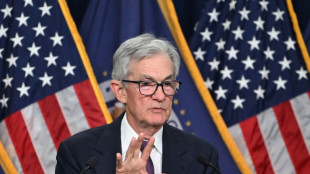

Saudi Aramco reports profit surge on day sites hit by Yemen rebels
Oil giant Saudi Aramco on Sunday reported a 124 percent net profit surge for last year, in results released hours after its facilities were hit by Yemeni rebel drone and missile strikes.
As the world economy started to rebound from the Covid pandemic, "Aramco's net income increased by 124 percent to $110.0 billion in 2021, compared to $49.0 billion in 2020," the company said.
The results followed news of the overnight attacks by Yemen's Iran-backed Huthi rebels, which caused no reported casualties but hit targets including Aramco facilities and a water desalination plant.
The attacks "led to a temporary reduction in the refinery's production, which will be compensated for from the inventory," said the Saudi energy ministry in a statement on state media, without providing numbers.
The Saudi-led military coalition which backs Yemen's government said it intercepted and destroyed ballistic missiles and drones launched towards Jizan and other areas in the kingdom, causing "damage" to several sites.
"Initial investigations indicate the militia used Iranian cruise missiles that targeted Al-Shaqeeq desalination plant and Aramco's Jizan bulk plant," it said in a statement.
Targets included a Dhahran Al-Janoub power station, an Aramco gas plant in Yanbu and a gas station in Khamis Mushait, it said.
The Huthis confirmed they had launched the drone and missile attacks targeting a number of "vital and important" sites, including Aramco facilities.
In 2019, Huthi-claimed aerial assaults on two Aramco facilities in eastern Saudi Arabia temporarily knocked out half of the kingdom's crude production.
The Saudi energy ministry said in its statement the attacks had targeted a gas plant and the YASREF refinery, which produces 400,000 barrels per day according to its website, in the Yanbu Industrial City on the Red Sea.
- 'Geopolitical factors' -
The kingdom, one of the world's top crude exporters, has been under pressure to raise output as Russia's invasion of Ukraine and subsequent sanctions against Moscow have roiled global energy markets.
Oil-rich Gulf countries, including Saudi Arabia, have so far resisted the pressure, stressing their commitment to the OPEC+ alliance of oil producers led by Riyadh and Moscow.
Aramco president and CEO Amin Nasser cautioned that the company's outlook remained uncertain due in part to "geopolitical factors".
Alluding to the effect price spikes have had on consumers, he noted that "energy security is paramount for billions of people".
"We continue to make progress on increasing our crude oil production capacity, executing our gas expansion program and increasing our liquids to chemicals capacity," Nasser added.
On the latest results, for 2021, he acknowledged that "economic conditions have improved considerably".
The oil giant had in 2019 achieved a net income of $88.2 billion before the pandemic hit global markets, resulting in huge losses for the energy and aviation sectors, among others.
A strong rebound last year saw demand for oil increase and prices recover from their 2020 lows.
Brent crude has repeatedly spiked above $100 per barrel lately, driven by supply concerns centred on Russia's invasion of Ukraine.
Saudi Aramco also said capital expenditure in 2021 was up 18 percent on 2020 at $31.9 billion, a figure it expected to raise to approximately $40 billion-50 billion this year, before further growth.
Saudi Arabia has sought both to open up and diversify its oil-reliant economy, especially since Mohammed bin Salman's appointment as crown prince in 2017.
Aramco floated 1.7 percent of its shares on the Saudi bourse in December 2019, generating $29.4 billion in the world's biggest initial public offering.
In February, the kingdom shifted four percent of Aramco shares, worth $80 billion, to the country's sovereign wealth fund -- a move seen as a possible prelude to further opening up the oil giant.
T.Peeters--JdB



